What You Can Do To Begin Decolonizing Travel
Last week, I examined several methods of travel that harm the environment and local communities while perpetuating imperial systems of inequality. Reflecting upon my own experiences participating in these modes of travel and conducting internet research has led me to envision a future of decolonized travel made possible through actions we must practice today. I’m not saying you must never backpack, volunteer, or hop on a boat ever again; it’s about changing the way we do these things presently.
First and foremost, we must focus on our humanity here on earth. How do we live within the limits of a body and a place and a time? How do we get along with others and share resources? How do we take steps into the fullness of our humanity, creating opportunities to experience life in all its forms, then spreading these opportunities with as many people as possible? How work can we begin to do at home in order to create a more welcoming world?
Think Beyond Yourself
1. An empathetic heart and open mind leads you to many new places. Before visiting a country, it is wise to research the culture, politics, current state of affairs, and history, especially the country’s history with colonialism and imperialism. Consider its lingering effects on modern-day society. Wikipedia is a great place to start! Seek perspectives beyond Western news media. No one expects you to know every fact, but contextual knowledge can deepen your travel experience and help you respect the host country’s culture.
2. Before picking a destination, some travelers research a country’s treatment of women, Black people, or whichever of these experiences that make up your identity. But if you aren’t queer or Muslim or what have you, would you still research that information? It’s likely not; I hadn’t. But I encourage you to see why others may be more hesitant to visit a certain place; we must see ourselves as allies and accomplices to the full liberation of oppressed groups worldwide. It’s likely that ill treatment of a particular group coincides with their history with colonialism or imperialism.
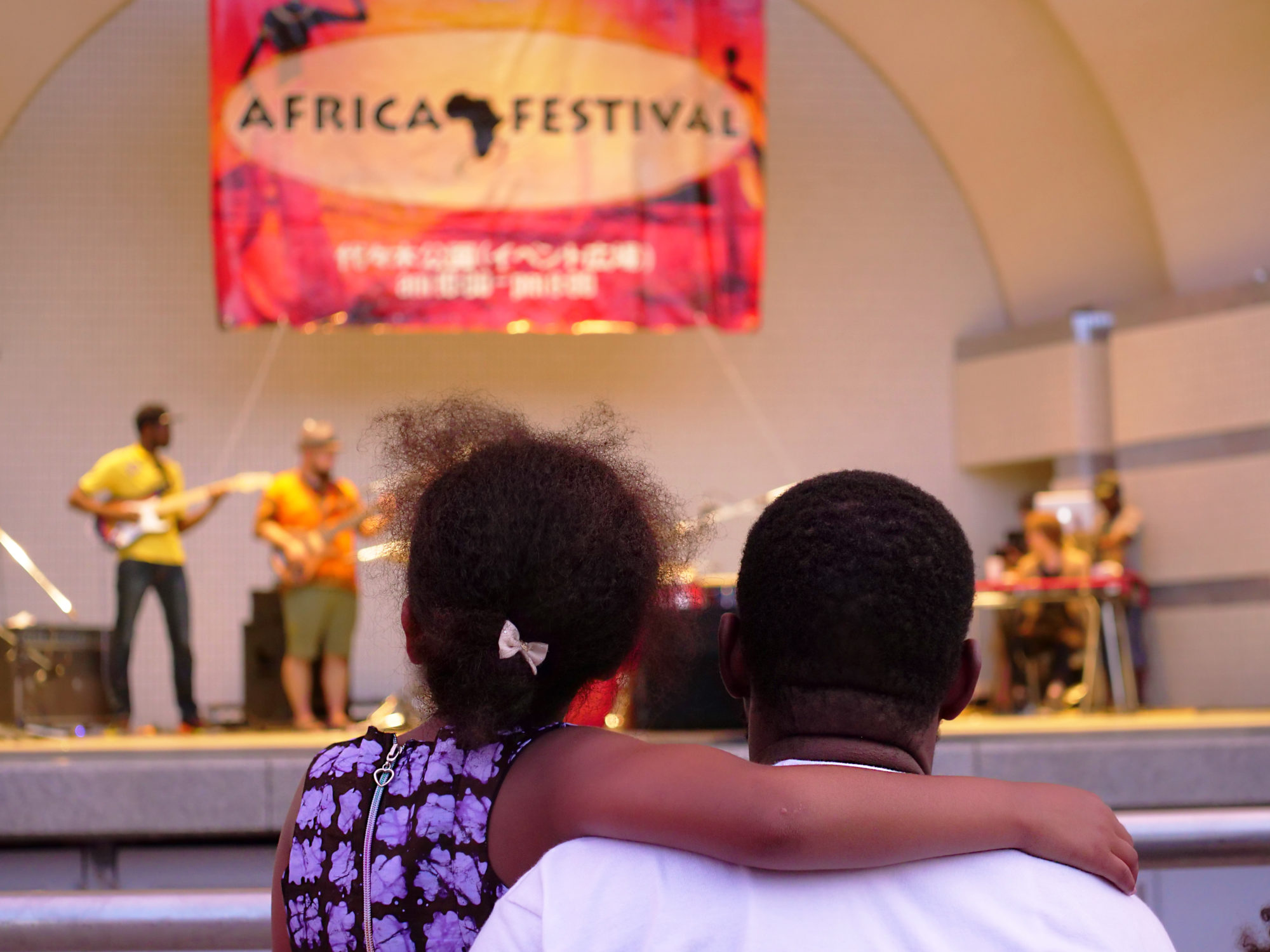
A father and daughter watch a performance at the Africa Festival in Tokyo. Anti-blackness is pervasive in many Asian countries, but festivals like this build community among members of the African diaspora in Japan. Photo by Lauren Bally, 2018.
3. With your newfound knowledge, research different movements that you could donate to or get involved with in-country, like Land Back. This will take more research; social media may lead you to some great organizations. Email organizers to ask what you can do to support their cause or spread awareness in your country, holding humility and a sense of solidarity, not superiority, at the forefront of your intention.
Read Personal Perspectives
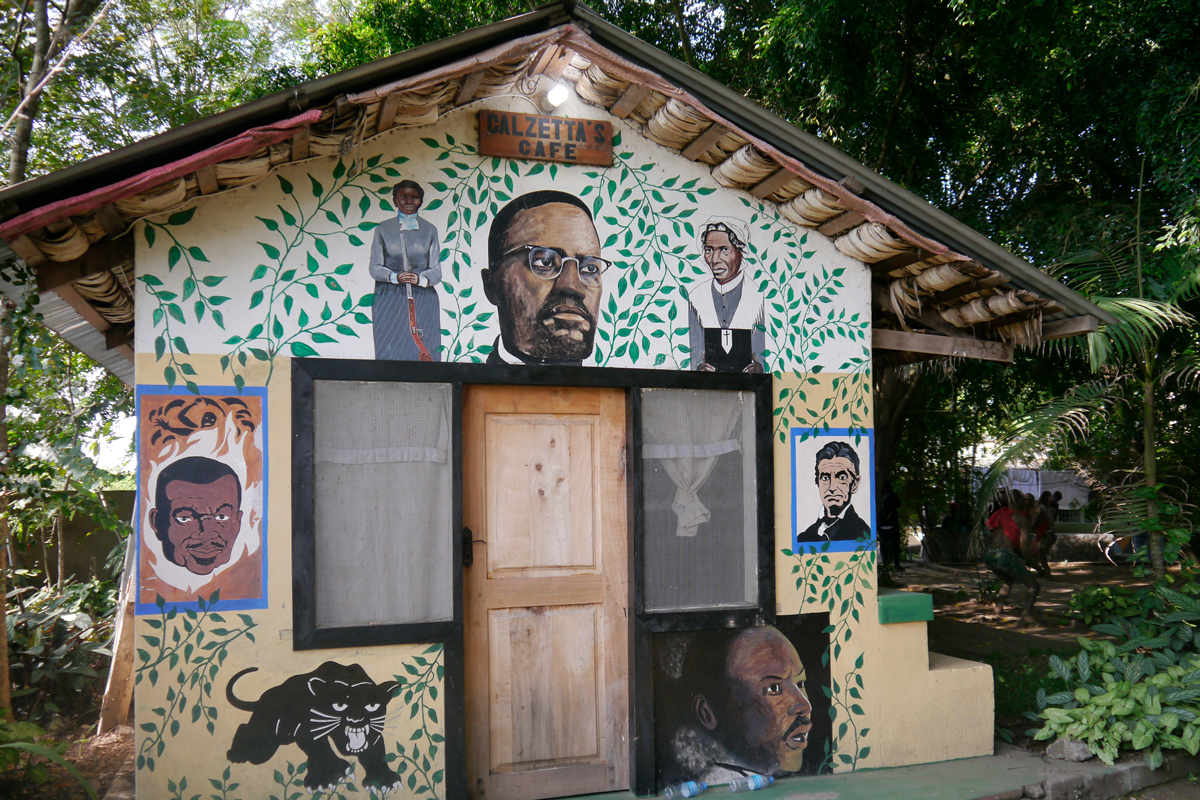
Black Panthers Pete & Charlotte O’Neal run the United African Alliance Community Center in Arusha, Tanzania, a community nonprofit providing programs and projects for the local community. The Calzetta Cafe features abolitionists and revolutionaries for Black liberation. Photo by Lauren Bally, 2017.
4. Now that your head is buzzing with information, take a break from staring at a screen, and read some books! Buy from a local bookstore, used book website, or borrow for free from your local library. Read a novel by an author of the country you will visit, be it a fictional tale or an autobiography. You’ll get such detailed insight into a particular space and time. Read books by anti-colonial and anti-imperial revolutionaries, such as Ho Chi Minh, Che Guevara, Assata Shakur, and Thomas Sankara. Analyze the aspects of their movements to bring radical change. How can we learn from their movement’s successes and failures? Then read books and articles by the thinkers who influenced them! How did revolutionaries utilize these theories for their own movement’s agendas? What concepts could we use today with the aid of technology and the internet? Read books by travel writers who are queer, BIPOC, or from other marginalized backgrounds, like Langston Huges, bell hooks, Hokulani K. Aikau, and Faith Adiele. Join or start a book club! Hop back online to check out some different BIPOC travel writers, bloggers, and organizations.
Reconsider Your Trip
5. Was your original trip in line with my listed prior methods of travel? Ask yourself, “Why do I want to visit _____?” To be frank, if it’s for “missions” to volunteer and proselytize, stay home. Research how missionaries paved the way for violent colonization in many countries throughout time. No White Saviors, based in Uganda, explains abuse caused by development workers and missionaries. It’s the first system we must leave behind, starting yesterday. Instead of spending money on plane tickets, hotels, and other fees, research a localized organization that can use that money to pay local workers to construct a building better than you can. If you want to help Black lives, you don’t need to go to Africa; it can be done at home in your local schools. If you want to advocate for women’s rights, you don’t need to go to “oppressed” countries, you can help those who are oppressed by restrictive abortion laws or domestic abuse in your neighborhood. Think globally, act locally. Let other countries embrace their indigenous religion in peace, and allow local people to take the reins of the blurry lines of human rights in religion.
Making Money Moves
6. First, we acknowledge there is no ethical consumption under capitalism due to the global system’s current and historical state-sanctioned violence, genocide, imperialism, and slavery to hoard profits. With this in mind, we are working under the current framework of capitalism, and tourism requires consumption to make a profit as a capitalist project. Thinking of my carbon emissions when traveling makes me anxious. Luckily, the internet has calculators with options to donate to causes offsetting your carbon emissions. It isn’t a perfect solution, but it’s worth a few extra dollars to aid a cause like planting trees, especially in lieu of global wildfires, deforestation, and desertification. Consider donating to marine causes, as the majority of our breathable oxygen is created by marine plants.
7. Stop haggling if you go to a country where your country’s currency is stronger than the local one. I’ve met tourists who were so proud of haggling as low as possible, but the extra cents in their pocket translate to a family meal for a vendor or tour guide. As a foreigner with a currency of higher value, it is logical that you will have to pay more. You aren’t getting “ripped off,” you’re helping pay for someone’s livelihood.
8. Invest in locally-run businesses. Try staying in a homestay or local inn instead of an AirBnB or a foreign-owned hotel franchise. Sample local cuisine at a family-run restaurant over a chain; if you don’t understand everything on the menu, politely ask a worker or look it up on the internet! I promise the McDonalds in this country is not much different than at home. If you want to take a tour, locally owned and operated companies are the way to go, especially indigenous-led heritage tours.
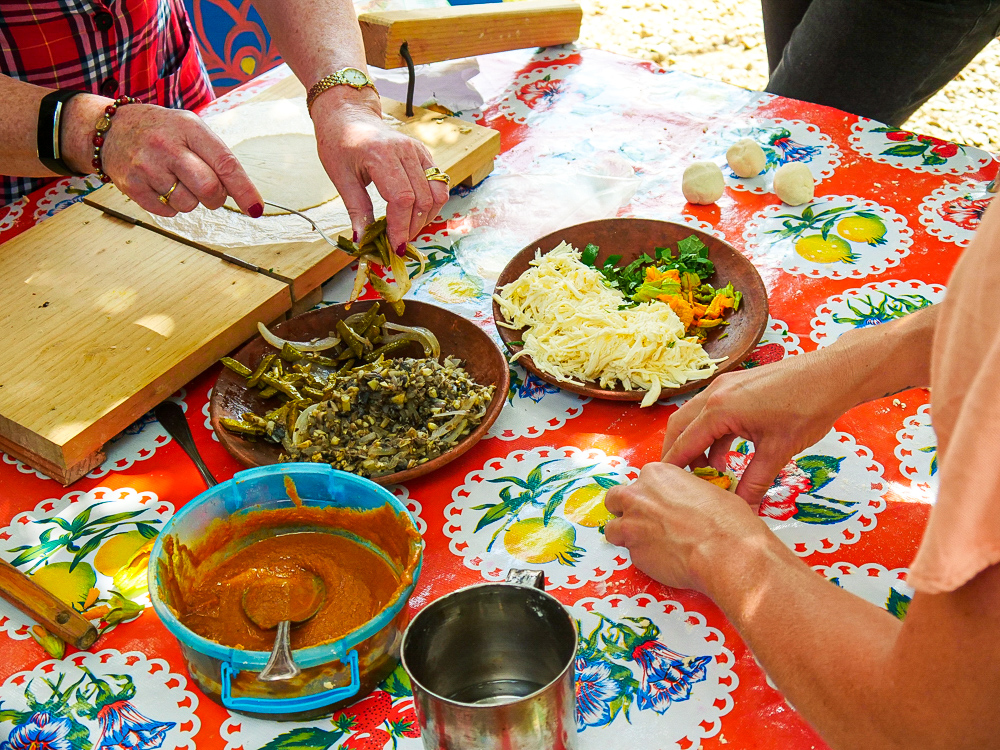
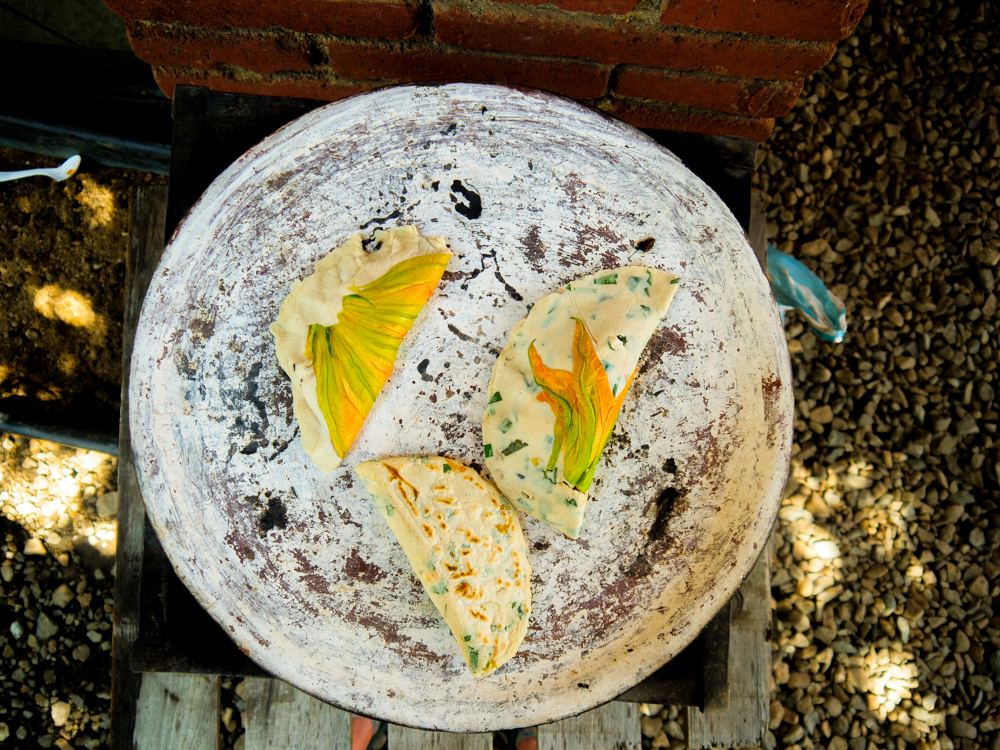
Tourists create their own empanadas, tacos, and quesadillas using traditional Oaxacan ingredients, such as nopales, huitlacoche, quesillo, flor de calabaza, and epazote at a Mexican-owned cooking school. Photos by Lauren Bally, 2019.
Be Respectful
9. Stop posing with locals as your Instagram props. Poverty is not a thing to romanticize, whether you are shooting the infrastructure of slums or posing with kids at refugee camps. Poverty porn is often used as a way to generate sympathy and money for a certain cause by reinforcing negative stereotypes about a country, and can influence children to drop out of school and beg tourists wanting to take photos. If you really want to take someone’s photo, make an effort to develop a connection with that person, and ask their permission! Poor people are not less deserving of privacy.

A group of high school students take a break from daily chores as their host sisters teach them traditional Maasai dance moves. This is an example of a photo that was taken with permission and does not look at the local children through a lens of inferiority. Photo by Lauren Bally, 2017.
10. Keep your energy consumption in mind as you travel. If you are in a hotel, don’t request fresh towels or sheets everyday; that’s a massive waste of water. Bring a reusable water bottle so you aren’t constantly buying plastic bottles. Let go of the entitled idea that “I have a right to do what I want” and instead embrace the concept that “I have an obligation to Mother Earth.” We must protect our living planet for current inhabitants and our future generation.
11. Remember that you are a guest in someone’s home. Travel with self-awareness and remain mindful of your actions. Learn basic phrases in the local language; I like to download the entire language for free on the Google Translate app so I can always access a pocket dictionary. Ask questions about locals’ lives, experiences, and culture, and open up if they want to know about your country’s culture too. Maybe you’ll start a conversation that challenges your perspective or create a lifelong friendship.
Give Back in a New Way
12. If you want to stay in a country for an extended time, consider utilizing a work exchange program that pairs you up with hosts who offer you free room (and sometimes meals) for a few hours of labor per day. It may lead you to a city or town you might have never considered, and you may learn a new skill like permaculture, or utilize skills you already have. Through Workaway I have made lasting friendships with hosts and co-workers through experiences in marine labs, cooking schools, and mushroom farms, to name a few.
13. I believe we all have something to offer. Ask yourself how you could utilize your passions and skills to develop your humanity and contribute to a better world? If an organization in another country needs a volunteer with your particular math or communications or scientific skillset, you could offer your support and teach some skills. If you come from an imperial country, know you have more access to resources. Sharing your skills, knowledge, and resources with others with less access works to mitigate that system of inequality.
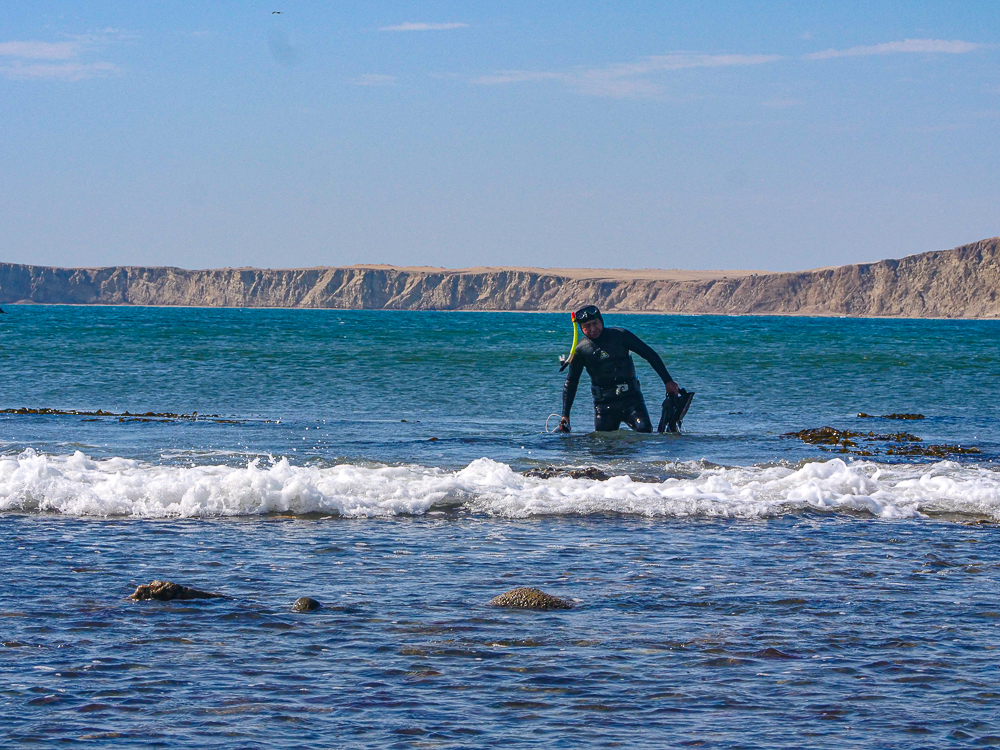
A workaway with marine biologists in Pisco, Peru involved creating “branches” of seaweed for aquaculture, and filming the lab’s work for marketing videos. I loved marrying my communications skills with environmental science. Photos by Lauren Bally, 2019.
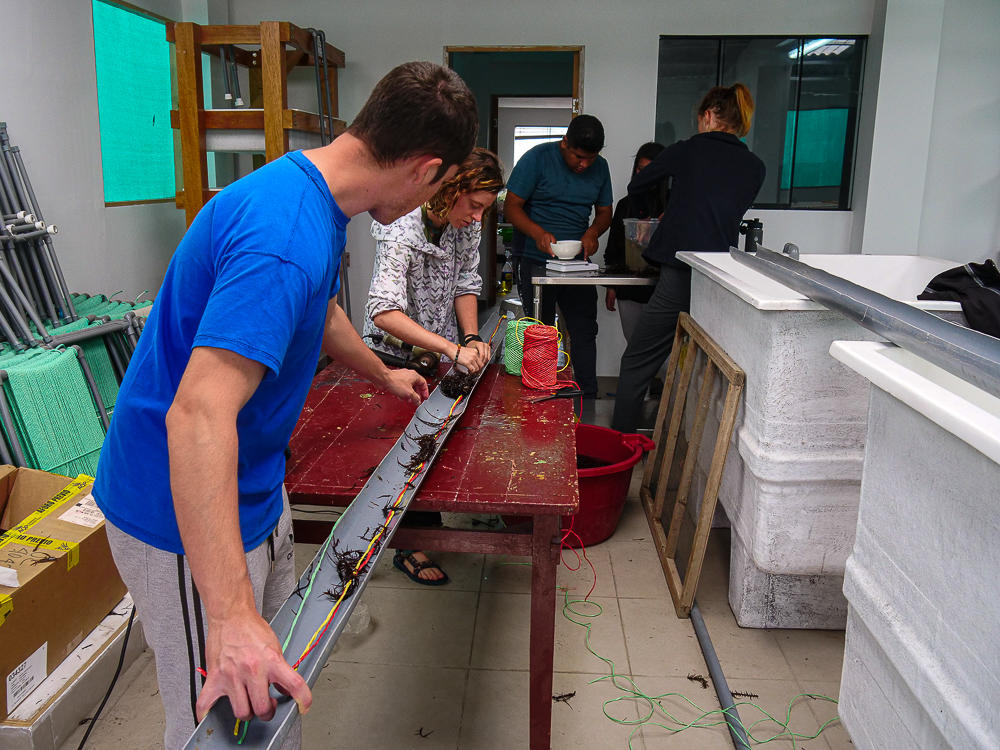
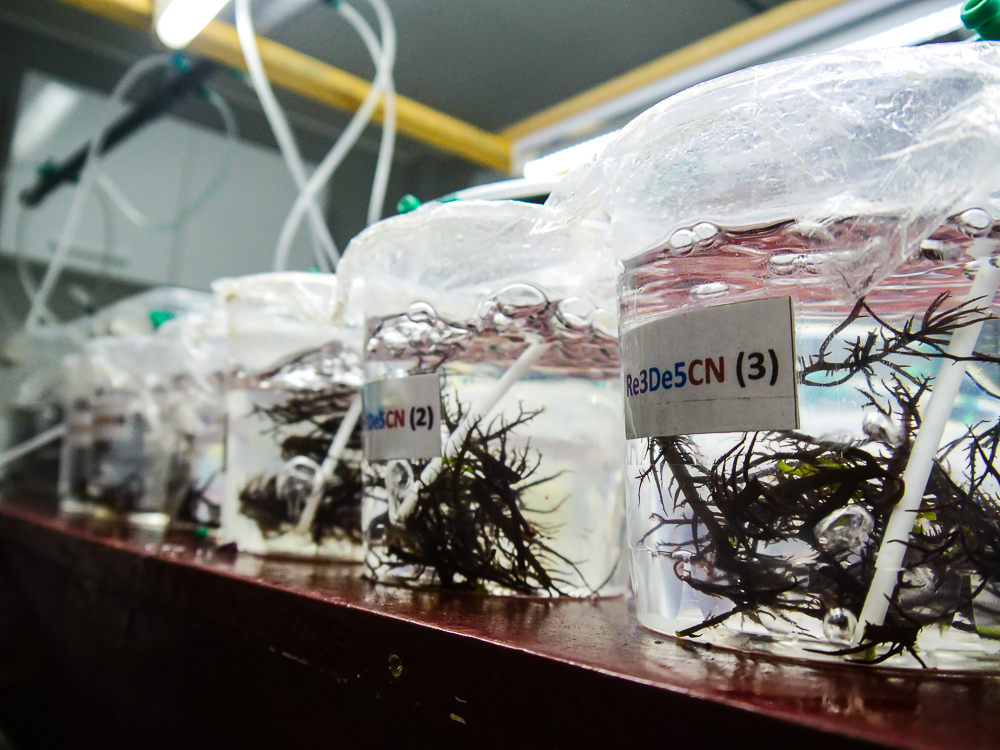
Find Ways to Travel at Home
14. Review this article again, this time with your home country in mind! Dismantling imperialism abroad begins at home. Injustice pervades every country, and addressing the problems of our countries can also create a more welcoming space for travelers. Settler colonialism and imperialism tell us to fear our neighbors, to be wary of immigrants taking resources, and to “escape” to a different country where you feel like you have wealth to spend and capital to attain at your fingertips. The reality is that chasing excess will not redistribute resources (of which there are plenty to go around.) We must imagine ways to redistribute resources from those who hoard to those in need.
15. Consider the immigration policies in your country. Which countries’ citizens have a harder time entering your country for tourism, education, or work, and why? Do immigration policies discourage certain demographics as thinly disguised racism or xenophobia? Are there ways you can pressure your government to change immigration policy for more open borders (as we hopefully head into a more COVID-free future)?
16. If you are unable to travel internationally, due to finances, time, or COVID, consider your ability to travel in your home country. Is there a mountain range or unseen city within a few hours? Explore the place you live with new eyes, and volunteer in your community.

An intricate headdress adorns a Samba dancer at a Brazilian Samba concert in New York City, USA. Photo By Lauren Bally, 2019.
So Much to Do, So Little Time
It’s easy to leave everything behind and take on a new identity in a novel place. Escaping to live in different cities and countries has been my mode of avoiding long-term commitment to literally anything and everything, a privilege I have had over those who must take on responsibility for their families and communities. But if we all shoulder a bit more responsibility at home, maybe those who have been working tirelessly can have a break too.
I hope you have insight on how to be more mindful as you experience the ups and downs of travelling. Hopefully we can work together to move towards a world that offers equal opportunities through the dismantling of our unjust system of transnational capitalism. In this way, travel can be within reach for people of all races, genders, sexualities, and incomes
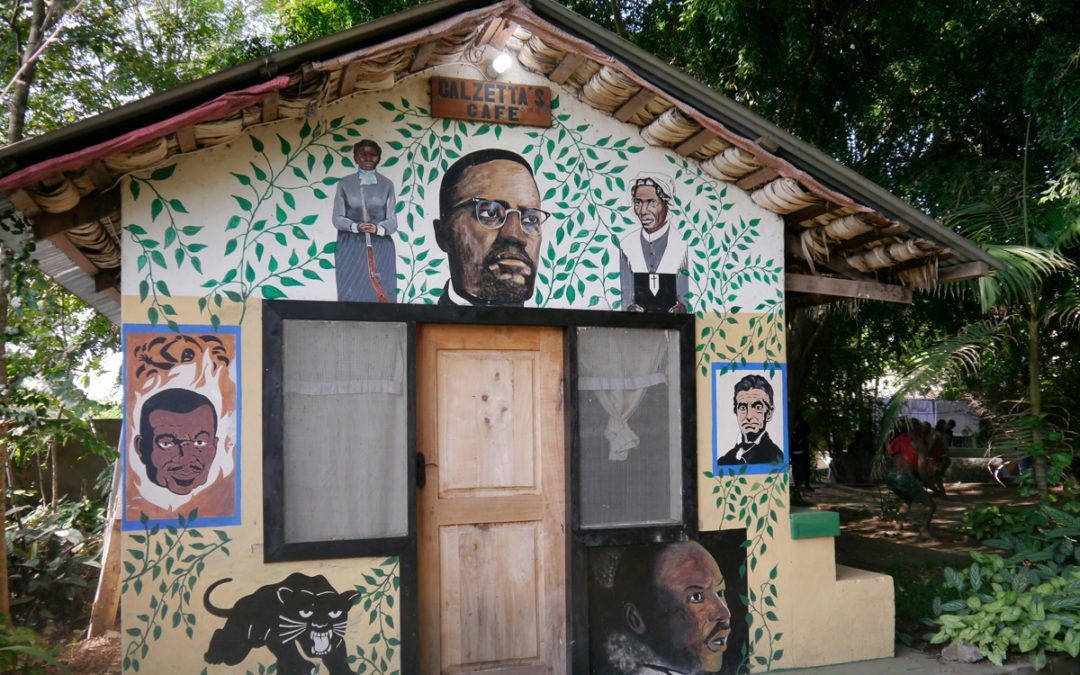
Recent Comments